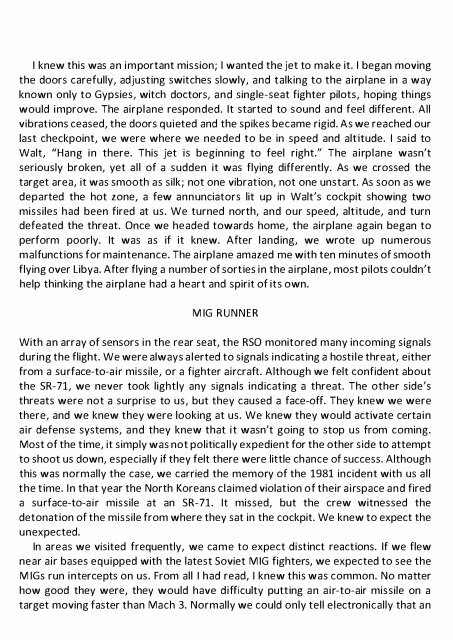You also want an ePaper? Increase the reach of your titles
YUMPU automatically turns print PDFs into web optimized ePapers that Google loves.
I knew this was an important mission; I wanted the jet to make it. I began moving<br />
the doors carefully, adjusting switches slowly, and talking to the airplane in a way<br />
known only to Gypsies, witch doctors, and single-seat fighter pilots, hoping things<br />
would improve. The airplane responded. It started to sound and feel different. All<br />
vibrations ceased, the doors quieted and the spikes became rigid. As we reached our<br />
last checkpoint, we were where we needed to be in speed and altitude. I said to<br />
Walt, "Hang in there. This jet is beginning to feel right." The airplane wasn't<br />
seriously broken, yet all of a sudden it was flying differently. As we crossed the<br />
target area, it was smooth as silk; not one vibration, not one unstart. As soon as we<br />
departed the hot zone, a few annunciators lit up in Walt's cockpit showing two<br />
missiles had been fired at us. We turned north, and our speed, altitude, and turn<br />
defeated the threat. Once we headed towards home, the airplane again began to<br />
perform poorly. It was as if it knew. After landing, we wrote up numerous<br />
malfunctions for maintenance. The airplane amazed me with ten minutes of smooth<br />
flying over Libya. After flying a number of sorties in the airplane, most pilots couldn't<br />
help thinking the airplane had a heart and spirit of its own.<br />
MIG RUNNER<br />
With an array of sensors in the rear seat, the RSO monitored many incoming signals<br />
during the flight. We were always alerted to signals indicating a hostile threat, either<br />
from a surface-to-air missile, or a fighter aircraft. Although we felt confident about<br />
the SR-71, we never took lightly any signals indicating a threat. The other side's<br />
threats were not a surprise to us, but they caused a face-off. They knew we were<br />
there, and we knew they were looking at us. We knew they would activate certain<br />
air defense systems, and they knew that it wasn't going to stop us from coming.<br />
Most of the time, it simply was not politically expedient for the other side to attempt<br />
to shoot us down, especially if they felt there were little chance of success. Although<br />
this was normally the case, we carried the memory of the 1981 incident with us all<br />
the time. In that year the North Koreans claimed violation of their airspace and fired<br />
a surface-to-air missile at an SR-71. It missed, but the crew witnessed the<br />
detonation of the missile from where they sat in the cockpit. We knew to expect the<br />
unexpected.<br />
In areas we visited frequently, we came to expect distinct reactions. If we flew<br />
near air bases equipped with the latest Soviet MIG fighters, we expected to see the<br />
M IGs run intercepts on us. From all I had read, I knew this was common. No matter<br />
how good they were, they would have difficulty putting an air-to-air missile on a<br />
target moving faster than Mach 3. Normally we could only tell electronically that an


